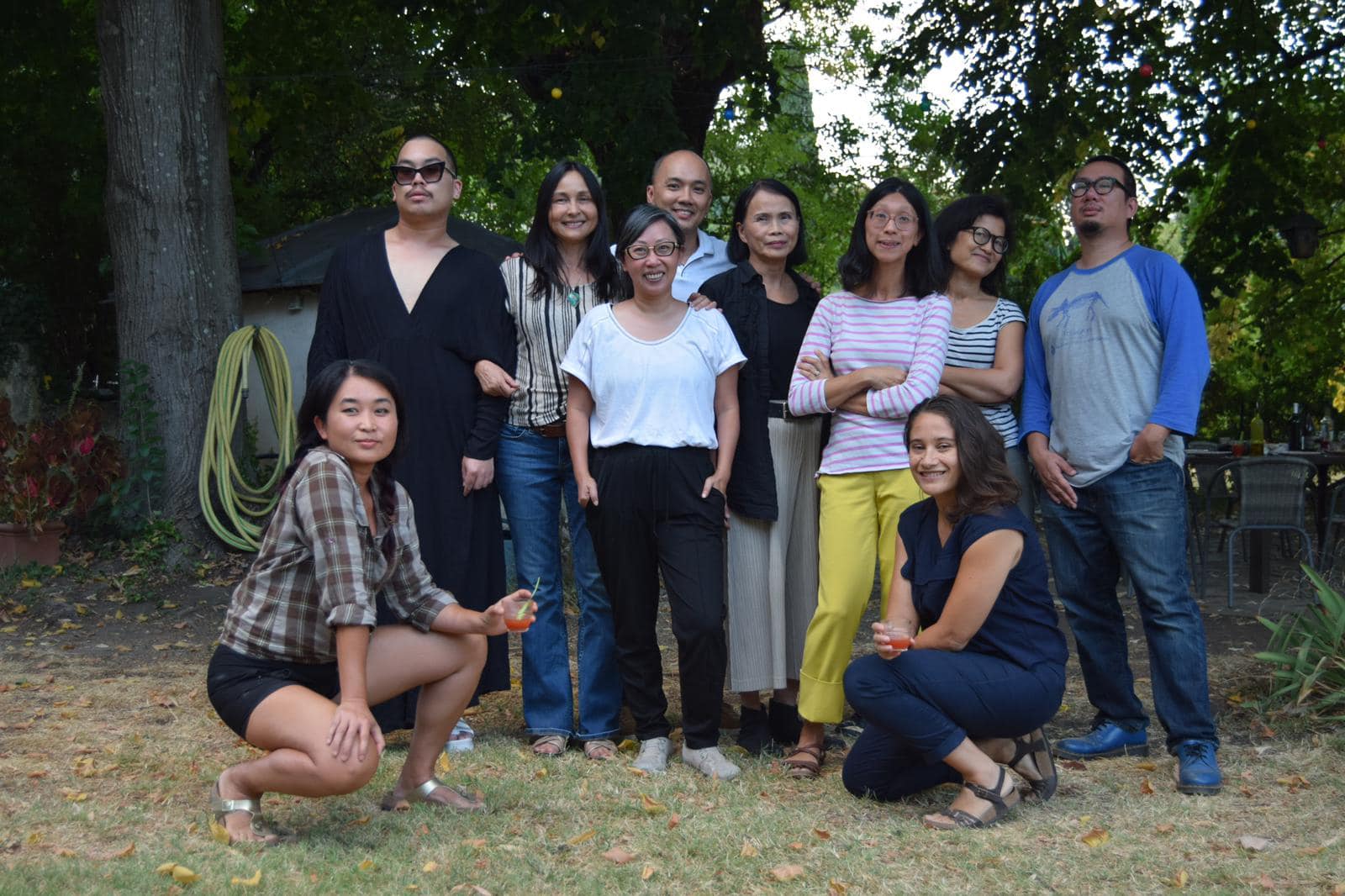
On Friday, September 15, 2023, DVAN and ICI Vietnam, a French group that hosts Vietnamese cultural events, put together an event that brought 10 diasporic Vietnamese authors together into 3 panels of conversation in Paris, France. The event was the culmination of DVAN’s recent two-week long writing residency in Cazilhac, France. Held at the Jean Pierre Melville Mediatheque in the 13th arrondissement of Paris, a mostly Vietnamese and Asian neighborhood, the sold out event brought together bookish people of diverse age and race, making for an attentive audience. Three languages loaded with a shared history of colonization and war– English, French, and Vietnamese– are tossed through the air freely. Seatmates mix and match words as they make small talk; the library shelves rise above seated heads as the chatter winds down and the evening begins.
According to Isabelle Pelaud, the executive director of DVAN, this was the group’s first international residency.
The cohort consisted of four American Vietnamese authors, four French Vietnamese authors, one Vietnamese author and one Israeli Vietnamese author: Thi Bui, Bao Phi, Paul Tran, Vu Tran, Doan Bui, Anna Moï, Hoai Huong Aubert-Nguyen, Thuân, Nguyen Qui Duc and Vaan Nguyen. With the barrier of language, they mostly spoke English and broken Vietnamese among each other in Cazilhac, Vu Tran told me at a dinner held after the event. Even so, they engaged in productive conversations and made great connections, according to Hoai Huong Aubert-Nguyen.
“I really joined this residency to meet other authors from different cultural environments. …We talked, we listened, we engaged in dialogues,” Aubert-Nguyen said. “It helped me better understand their narrative styles, their esthetics, their oeuvres. Because we talked a lot about literature, but also art, music, graphic novels, traveling and cuisine. So it was very full and very diverse.”
The event was created in part to share those full and diverse conversations with the public. It was set up with three panels covering three distinct topics: “History & Memory,” “Gender in the Diaspora,” and “Literature as Activism.” Nguyen Qui Duc was unable to attend, but audience members enjoyed the additional presence of Line Papin, a 27-year-old award-winning French Vietnamese author who recently released an English translation of her book Les os des filles with DVAN. Along with two talented translators, LyLan Dill and Susan Dixon, and three mediators, Isabelle Pelaud, Jess Boyd and My-Linh Dang, the 15-person group offered insights into their work and, for the American authors, introduced themselves to a new audience.
“This type of gathering is rare in France.” said Gabriella, a younger attendee. “I became interested very quickly in what they were talking about. They covered themes I didn’t know about and I felt that suddenly I had all these new things to read.”
Pelaud agrees. It is uncommon to see discussions around diaspora in France. “One thing I realized since being here is how unusual it is for people from one ethnic group, especially people of color, to present together in a panel-discussion like this,” she said. “To feel a sense of belonging is a very powerful thing that maybe French (people) who are not people of color just take it for granted.”
The sense of diaspora, it seems, may be stronger among Vietnamese Americans, who live in a country with much larger immigrant populations. Translation into English is an enticing opportunity for some of the French authors associated with DVAN. Papin, speaking about her recent translation of Les os des filles with DVAN, noted that reproducing her work in English has made her feel more included in the Vietnamese diasporic identity.
“I think that the notion of community is very strong,” Papin said. “That’s why with the book I translated in the States, I was able to meet with all the authors in that community. In France the community feeling is less strong than in the United States where it’s very present.”
Along with bridging language barriers, onlookers of all ages were present. Each generation brought its own set of history and memories that seemed to build off one another in their questions and responses. During the “History and Memory” panel, author Vu Tran said, “We spent two weeks complaining about parents” and a wave of laughter came from the audience before his response was even translated. He continued, “I love them very much but I often feel like they created as many problems as they tried to solve.”
Speaking openly about these difficult relationships was a way for the authors to reveal the inspirations and histories that inform their creative work. For poet Paul Tran, the question of parent-child relationship went beyond history, feeding into their understanding of language as a tool more broadly.
“I grew up being the family translator and had to translate for my mom at the doctor’s office, at the grocery store, in line for food stamps. So I learned very early that words arranged in the right order, into the right sentence, into the right argument can recover her human dignity from people who felt like she had little intelligence, little heart and little to say,” Tran said. “I understood that (the) English language was how the United States fought its second war in Vietnam. So as a writer working in English, I have to fight…two wars. The one that my mother escaped, the one that the country waged on us after, and the one that continues to be waged on us everyday.”
When a community is spread among continents as the Vietnamese community has been, intergenerational dialogue is extremely dependent on the individuals’ journeys and experiences. By having an open discussion about these differences, a sense of community was felt among the differences.
“Our communities are being scattered and fragmented because of colonization and wars. For us it makes sense to work together, to exchange ideas, to discuss,” Pelaud said. “It’s not often done, these diasporic gatherings…a lot of our families have been divided, scattered, fragmented. That’s part of our history so it makes sense for us to gather. And the more we do it, the more I see the value of it. Everyone has been full of joy here (Cazilhac) for two weeks.”
For the authors, these types of conversations are fruitful not only for their work, but for their personal histories as well.
“I want to continue learning and hearing from others.” Nguyen said. “I think it’s very nourishing to listen and engage in dialogue with others.”
Conversations among space and time that promote this kind of connection were made possible thanks to the DVAN residency, according to Isabelle. The event’s goal was to share this knowledge with a larger community, and promote that connection outside of the world of published authorship.
“It’s almost as a gift. Here we are in this place for two weeks, it’s wonderful and we want to give back to the community by showing up and sharing,” Pelaud said. “The presence is an offering to the community.”
Note: We would like to remember Nguyen Qui Duc, who was originally meant to be part of the residency and the panel.
Melina Kritikopoulos is a mixed-race writer and journalist of Greek and Vietnamese descent. She is an undergraduate student at the University of California, Berkeley where she works for The Daily Californian. She produces and hosts the podcast Poetic Pontification, highlighting poets of the East Bay Area.
Liked what you just read? Consider donating today to support Southeast Asian diasporic arts!

Melina Kritikopoulos is a mixed-race writer and journalist of Greek and Vietnamese descent. She is an undergraduate student at the University of California, Berkeley where she works for The Daily Californian. She produces and hosts the podcast Poetic Pontification, highlighting poets of the East Bay Area.
Liked what you just read? Consider donating today to support Southeast Asian diasporic arts!


